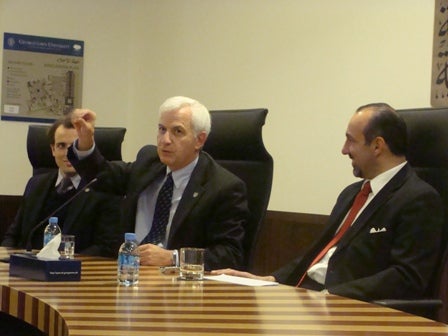Dialogue Series, Distingushed Lectures, Regional Studies
Ambassador Larocco on the Gulf Looking East

On February 26, 2012, CIRS hosted a Focused Discussion with Ambassador James Larocco Distinguished Professor and Director of the Near East South Asia Center at the National Defense University in Washington, DC. The talk titled, “The Gulf Looking East: Afghanistan, Pakistan, India, and Iran,” was supported by the United States embassy in Qatar. Citing full academic freedom, Larocco gave his take on the Gulf’s relationship with its neighbors “from Marrakesh to Bangladesh.” He explained to the audience how representing a research center afforded him freedom from the official US diplomatic stance, and that he was able to have frank conversations with Pakistani and Iranian authorities.
The Ambassador recounted his experiences as a diplomat in the Middle East. His interest in the region began in the 1970s and he has been a regular resident in the region for many years. Most recently, Larocco described his role as that of an educator, rather than an emissary of the US government. Describing, the Near East South Asia Center, he said that it is an institution that “was deliberately created to try to bring people together from this region to have serious dialogue, to create communities of influence, to eliminate misunderstandings, and to – as much as possible – open minds.” There are currently over 3,000 of the center’s alumni in leadership positions all over the world, he said. In fact, the alumni are so prevalent in politics, that they constituted members of both the government as well as the opposition in a recent political dispute in the Maldives.
The current nexus of power in the Middle East, the Ambassador said, includes Turkey, Saudi Arabia, Iran, and Israel – all of which exert tremendous amounts of hard and soft power, and will continue to do so. Pakistan and Afghanistan, Larocco said, are in extremely difficult situations for which he did not see an immediate solution – although he suggested that Qatar’s diplomatic and economic efforts could play a leading role in the future of Pakistan.
Moving further east, the Ambassador said that he did not see China as a military threat, but as a country that has grown powerful through commerce. China’s expansion “is strictly based on its mercantilist policy of securing economic interest because China has to produce 20 million jobs every year.” Much of the US government’s efforts in South Asia, Larocco said, have been established in order to contain the growing influence of China, although this has never been acknowledged as official US policy. In the next few years, people will notice that US policy, as well as naval and military presence, will shift towards South Asia, he said.
Larocco concluded by saying that “the Middle East, for the most part in the United States, is a problem to be worked with and to be endured, whereas South Asia and the Asia Pacific region are considered the future for the policy of the United States”. In addition, because of its strategic geographic location, roughly 50% of all world trade passes through the Indian Ocean, and so this also increases the challenges that will be faced in relation to maritime security. Because the local institutions and infrastructure are inadequately equipped to deal with the myriad future challenges, including the increased threat of maritime piracy, the Ambassador explained that “the Indian Ocean is going to be the focus of either conflict or cooperation.”
Retired ambassador James Larocco joined the NESA Center as a distinguished professor in August 2009, after serving more than 35 years as a diplomat. During the past 15 years, he held key leadership assignments related to the Near East region, including Director General of the Multinational Force and Observers (MFO), 2004-2009; Principal Deputy Assistant Secretary of State for the Near East, 2001-2004; U.S. Ambassador to the State of Kuwait, 1997-2001 and Deputy Chief of Mission and Charge D’Affaires in Tel Aviv, 1993-1996. His earlier postings included assignments as Deputy Director of Afghanistan, Pakistan and Bangladesh Affairs at the State Department in Washington and key positions in American embassies in Egypt, Kuwait and Saudi Arabia. He left the Foreign Service with the personal rank of Career Minister, which equates in U.S. military terms to Lieutenant General. During his career, Ambassador Larocco received numerous awards, including the Distinguished Service Award that was personally presented to him by then Secretary of State Colin Powell.
Article by Suzi Mirgani, Manager and Editor for CIRS Publications.